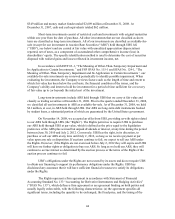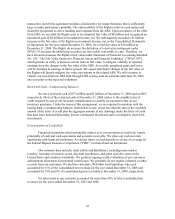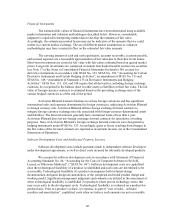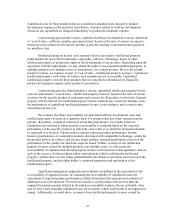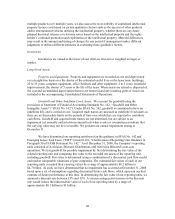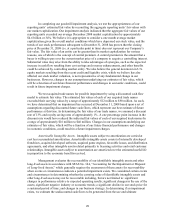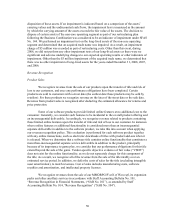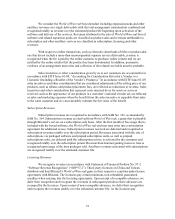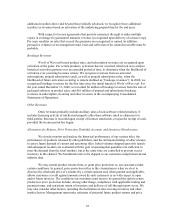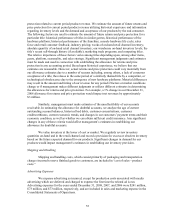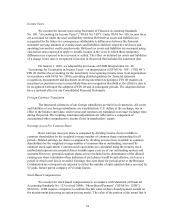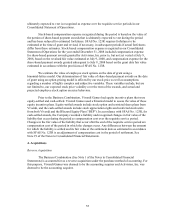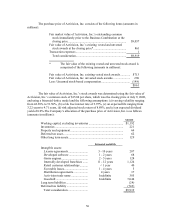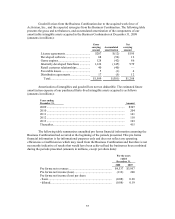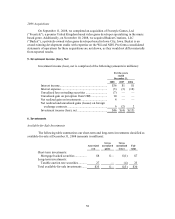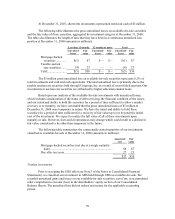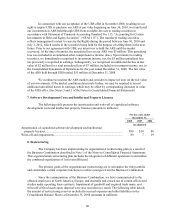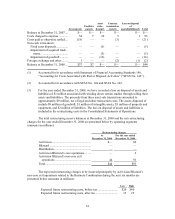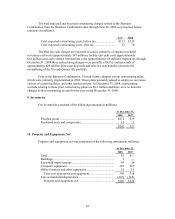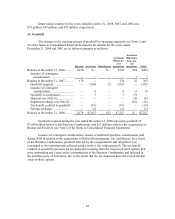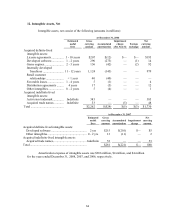Activision 2008 Annual Report Download - page 68
Download and view the complete annual report
Please find page 68 of the 2008 Activision annual report below. You can navigate through the pages in the report by either clicking on the pages listed below, or by using the keyword search tool below to find specific information within the annual report. 54
Income Taxes
We account for income taxes using Statement of Financial Accounting Standards
No. 109, “Accounting for Income Taxes” (“SFAS No. 109”). Under SFAS No. 109, income taxes
are accounted for under the asset and liability method. Deferred tax assets and liabilities are
recognized for the future tax consequences attributable to differences between the financial
statement carrying amounts of existing assets and liabilities and their respective tax bases and
operating loss and tax credit carryforwards. Deferred tax assets and liabilities are measured using
enacted tax rates expected to apply to taxable income in the years in which those temporary
differences are expected to be recovered or settled. The effect on deferred tax assets and liabilities
of a change in tax rates is recognized in income in the period that includes the enactment date.
On January 1, 2007, we adopted the provisions of FASB Interpretation No. 48,
“Accounting for Uncertainty in Income Taxes—an interpretation of SFAS No. 109”, (“FIN 48”).
FIN 48 clarifies the accounting for the uncertainty in recognizing income taxes in an organization
in accordance with SFAS No. 109 by providing detailed guidance for financial statement
recognition, measurement and disclosure involving uncertain tax positions. FIN 48 requires an
uncertain tax position to meet a more-likely-than-not recognition threshold at the effective date to
be recognized both upon the adoption of FIN 48 and in subsequent periods. The adoption did not
have a material effect on our Consolidated Financial Statements.
Foreign Currency Translation
The functional currencies of our foreign subsidiaries are their local currencies. All assets
and liabilities of our foreign subsidiaries are translated into U.S. dollars at the exchange rate in
effect at the balance sheet date, and revenue and expenses are translated at average exchange rates
during the period. The resulting translation adjustments are reflected as a component of
accumulated other comprehensive income (loss) in shareholders’ equity.
Earnings (Loss) Per Common Share
Basic earnings (loss) per share is computed by dividing income (loss) available to
common shareholders by the weighted average number of common shares outstanding for all
periods. Diluted earnings per share is computed by dividing income (loss) available to common
shareholders by the weighted average number of common shares outstanding, increased by
common stock equivalents. Common stock equivalents are calculated using the treasury stock
method and represent incremental shares issuable upon exercise of our outstanding options and
warrants. However, potential common shares are not included in the denominator of the diluted
earnings per share calculation when inclusion of such shares would be anti-dilutive, such as in a
period in which a net loss is recorded. Earnings (loss) per share for periods prior to the Business
Combination are retrospectively adjusted to reflect the number of split adjusted shares received by
Vivendi, former parent company of Vivendi Games.
Stock-Based Compensation
We account for stock-based compensation in accordance with Statement of Financial
Accounting Standards No. 123 (revised 2004), “Share-Based Payment” (“SFAS No. 123R”).
SFAS No. 123R requires companies to estimate the fair value of share-based payment awards on
the measurement date using an option-pricing model. The value of the portion of the award that is


